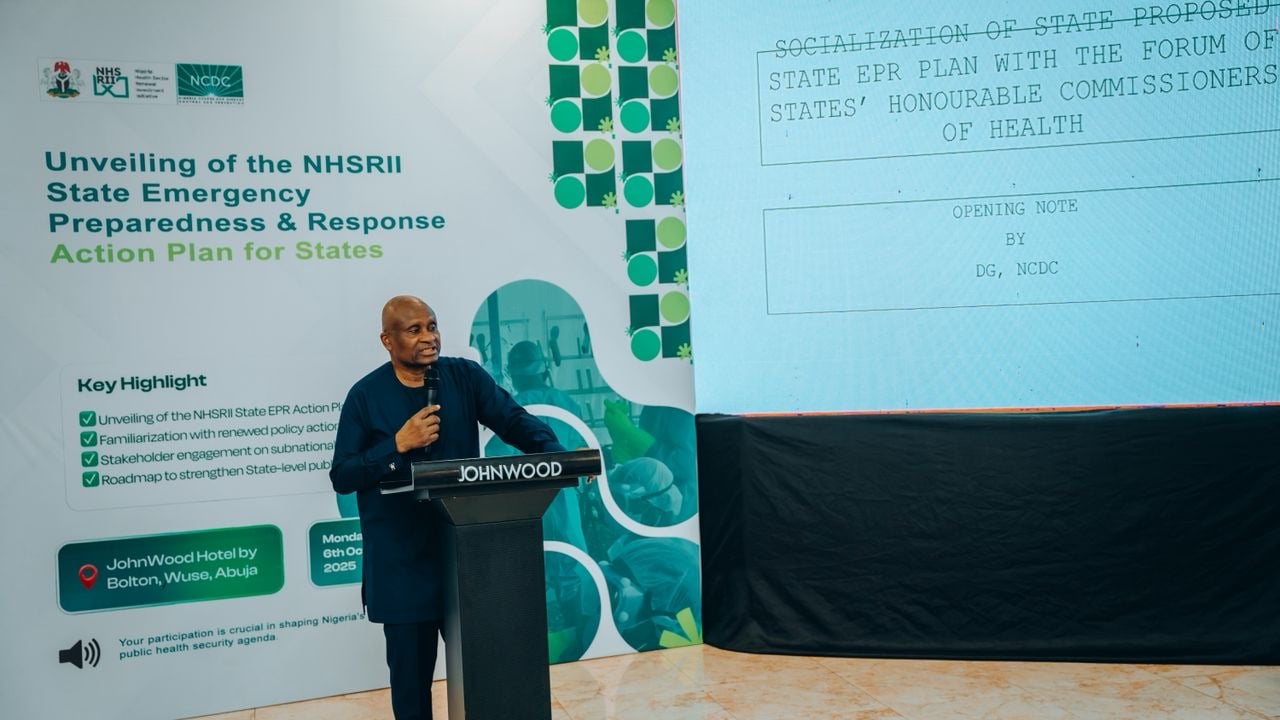The Nigeria Centre for Disease Control and Prevention (NCDC) has called on state governments to strengthen their emergency preparedness and response systems as part of efforts to improve health security across the country.
The appeal was made on Monday in Abuja during the unveiling of the Nigeria Health Security Reform Implementation Initiative (NHSRII) State Emergency Preparedness and Response Action Plan, which is designed to help states build stronger capacities to handle public health emergencies and climate-related events.
According to the NCDC, public health crises and climate disasters are becoming more frequent and complex, putting pressure on health systems and reversing progress toward the Sustainable Development Goals (SDGs). To effectively tackle these challenges, states must be able to prevent, detect, and respond quickly when outbreaks occur.
The new plan serves as a roadmap for Nigeria’s 36 states and the Federal Capital Territory (FCT) to strengthen coordination, surveillance, and response to epidemics and other emergencies. Supported by the World Bank, the framework allows states to adapt the plan to their local realities while aligning with national health security standards.
Speaking at the event, NCDC Director-General, Dr. Jide Idris, stressed that most public health emergencies — such as Ebola, COVID-19, and other infectious diseases — usually begin at the community level, where response systems are weakest.
He emphasized that while the NCDC provides national coordination, real progress must start from states and local governments, which often struggle with limited infrastructure, funding, and technical capacity.
“This is why we must build capacity at the subnational level,” Dr. Idris said. “Viruses start in communities. If we can’t mount an effective response where they emerge, then it’s a waste of time. Each state has its own unique challenges — culture, language, infrastructure — and we must build systems that reflect these realities.”
He added that the framework offers states a guide for decision-making and coordinated action, detailing practical steps to strengthen public health security. “It’s not a one-size-fits-all document,” he noted. “States will review it, give us feedback, and we’ll refine the final plan together.”
Dr. Idris explained that the document provides clear, actionable policies for improving epidemic preparedness and response and has been adopted as the national policy direction for states under the One Health framework, which integrates human, animal, and environmental health.
In his remarks, Dr. Oyebanji Filani, Chairman of the Forum of Health Commissioners, praised the NCDC’s collaborative approach. He described the initiative as an important step in ensuring that preparedness begins before outbreaks occur, not after.
Read Also;
NCDC Calls for Unified Emergency Response to Strengthen Epidemic Preparedness
“States have always been at the forefront of early detection and response,” Dr. Filani said. “This engagement helps deepen our capacity to identify early warning signs, share information, and develop robust, actionable plans that truly work for our people.”
He assured that states remain committed to investing in health infrastructure and developing effective early warning systems to contain outbreaks quickly.
Feedback gathered from the states will be incorporated into a final action plan to guide full nationwide implementation of the NHSRII initiative.




